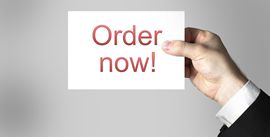Do You Still Need a Cover Letter?
With the majority of job applications now being made either by email, via a job website or directly via an employer's vacancy page, you may feel that there is no longer any need for a cover letter.
An email template appears to be little more than an electronic equivalent of an envelope that only requires addressing. Unfortunately, if you act on this belief and write no more than 'Please find CV attached', you will have missed a golden opportunity to communicate your worth to the employer and make your professional CV stand out from the rest.
Worse, your email may simply be deleted, as the recruiter may receive hundreds of emails each day and reserves their limited time for candidates who demonstrate basic communication skills by writing a cover letter.
The fact is that even if you are applying by email or a jobs' website, you need to provide a version of a cover letter. This should aim to draw attention to your major selling points - i.e. your work history, skills, strengths and aptitudes.
This gives the employer a reason to bother opening your attached CV. You need to make your email and therefore your application stand out.
Email Cover Letter - Basic Differences
Writing an appropriately styled cover letter does not mean simply copying your existing cover letter. You have to recognise the limitations of the media that you are using. Electronic communications tend to be shorter in length, as nobody likes long emails, or bothers to read them through to the end.
It's always best to stick to shorter paragraphs of two or three sentences each. Aim to have your entire note visible on a single screen, with no scrolling required. As a general guide, 180 words should be your maximum.
The subject line is important, so don't waste it by leaving it blank. Insert the vacancy reference number, but add more: entice the reader to open the email by being more descriptive with a line such as: 'Experienced marketing professional for Marketing Manager vacancy'. Be moderate in your language though, otherwise you may not get taken seriously.
You generally have less control over formatting, because even if you can use interesting fonts and graphics, the recipient's email package may not have the same settings, or may read in plain text only. You should use a simple font, such as Times Roman or Arial, in 10 point size. Avoid colours.
Relevance and Keywords on a Cover Letter
Another major difference between electronic and hard copy cover letters is that the email or form submitted cover letter is eminently searchable. Many recruiters or large employers will use scanning software to filter hundreds of emails down to a smaller number that match their search criteria.
You should therefore ensure that your cover letter, although short, includes keywords from the job advertisement, along with industry buzzwords and commonly used phrases for skills, strengths and experience.
This brings into focus the need to create individual cover letters (or notes) for each job you apply for in this way - unless the positions are all very similar, in which case the same keywords will apply.
The inclusion of keywords means that you should be conducting some research for each position you apply for. This should add shape to your content. Given that the letter will be more of a note, comprising two to three short paragraphs, you should pack these with relevant information.
This will make your note more hard-hitting and therefore attention grabbing. See what the employer's priorities are and reflect these in what you mention. The most important information should be absolutely unmissable in the first paragraph, and so on.
If necessary, look at job descriptions for similar jobs and see what language is being used. The more research you do, the more targeted you can make your speculative cover letter, increasing your chances of success.
Using a Cover Letter on CV Distribution Services and Jobs' Databases
You should carefully research these services and then decide what you are trying to achieve by using them. When registering and uploading (or pasting) your CV, you are usually asked to identify as many as five preferred industries or job titles.
Do not be tempted to cast the net too wide, as your cover letter will lose focus and end up interesting nobody. In many instances, you are provided with a single box in which to enter your cover letter.
You will need to condense the highlights of your application even more to create impact in the first paragraph - if you fail to attract the reader's interest in that short space, then they will not be reading on to the second or third paragraph. Even better, an attention grabbing achievement will really make the employer want to read more.
Need help putting together a great CV? Then our CV writing service can make a real difference by producing a first-class CV for you that wins over employers and makes them want to interview you.
Speculative Cover Letter
If you are emailing an application to a person or human resources department that you have not talked to before, when no vacancy is currently being advertised, you are submitting what is known as a 'speculative application'.
The challenge is greater in this case, as your need to get the email cover letter properly worded is critical, or your email will not get looked at. That first paragraph must be outstanding.
Generally speaking, it is better practice to speak to the person beforehand if you can, because if they have heard your name before and understand that you will be writing, they are far more likely to read the content of your letter when it arrives.
This kind of cold call must follow prior research. You can then refer to the phone conversation at the start of the cover letter.
If you have had prior networking contact with someone in the organisation, it will be easier to make this speculative application. Your research and possession of a contact name will help enormously when used in the first line of the cover letter.
What to Avoid in Your Cover Letter?
There are a number of pitfalls when it comes to online cover letters. First, always follow the employer's instructions for online applications. If they ask for a cover letter, always write one. If they ask for you to include the CV in a particular format, always do so.
Never write a cover letter for a jobs' board or database that refers to more than one job or industry. Always be specific.
Don't use abbreviations or 'text-speak'. You should always sound as professional as if sending in a formal, printed letter. Don't allow spelling or grammatical errors to get through. Always use the spell check and double check formatting by first sending a copy to yourself.
The golden rule: don't send an email to an anonymous person if you have a contact name to use. If forced to use a generic email inbox, then write FAO: in the subject line, along with your header.
Summary
A cover letter is still necessary when you are browsing and applying for jobs online. This is true whether you are applying directly to an employer or uploading your CV to a database on a jobs' site.
If you fail to write one, you are missing a key opportunity to stand out from the rest of the applicants and get your CV selected for a closer look. The online cover letter does differ from the printed cover letter in several ways.
Firstly, nobody likes to read lengthy writing on the computer screen, so your letter needs to be shorter - around 180 words and no more than three paragraphs.
With emails, there is a subject line to make use of by including the job reference number and a short selling phrase. Formatting should be very simple. The electronic document is searchable, so you should research and include keywords relevant to the vacancy.
When uploading or pasting your CV to job distribution services and databases on jobs' sites, you may only have one box to paste your cover letter in. Keep it short and create maximum impact in the first paragraph. Try to focus on one or two types of job, rather than anything and everything. Then your cover letter can be focused and is more likely to get you noticed.
When submitting an unsolicited application online, the cover letter is vital. It is best if you can refer to an earlier telephone conversation or mutual acquaintance you have networked with in the first line. Make maximum use of the subject line to avoid having your email deleted without being opened.
Address your email to a named person whenever possible. If forced to use a generic email address, write FAO: [name] in the subject line.
Other pages you may wish to view:
- Professional CV Service
- Professional Cover Letter by Bradley CVs
- How Your Cover Letters Can Kill Your Job Chances
- How to Write a Cover Letter That Gets You Noticed
- How to Write a Cover Letter (for Postal Applications)
- How to Write a Covering Letter (for Online Applications)
- Cover Letter Examples
- How to Write a Letter
- How to Produce a Good Cover Letter






